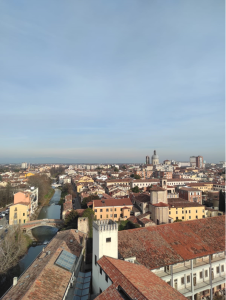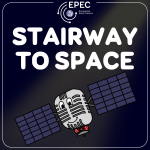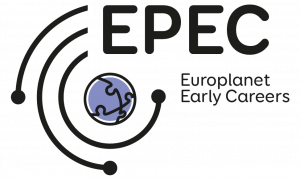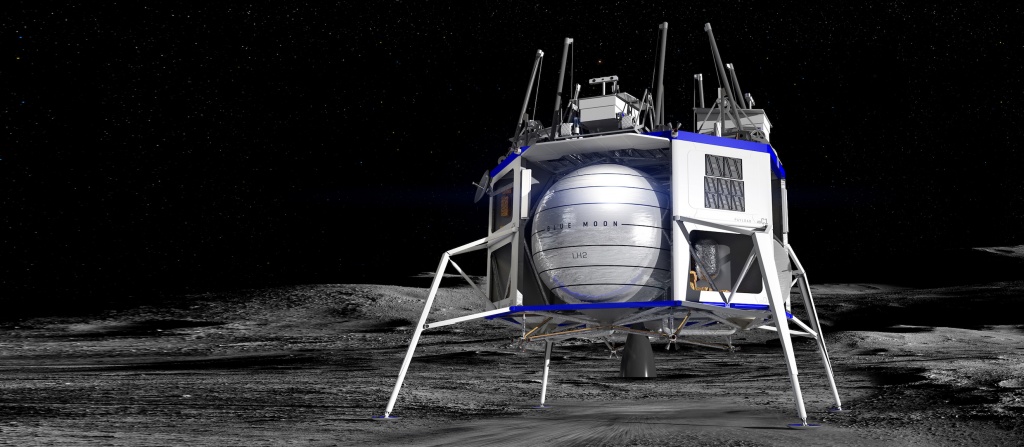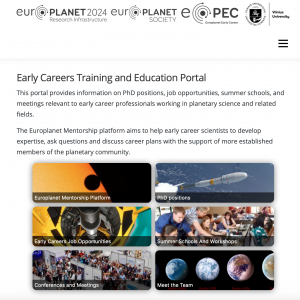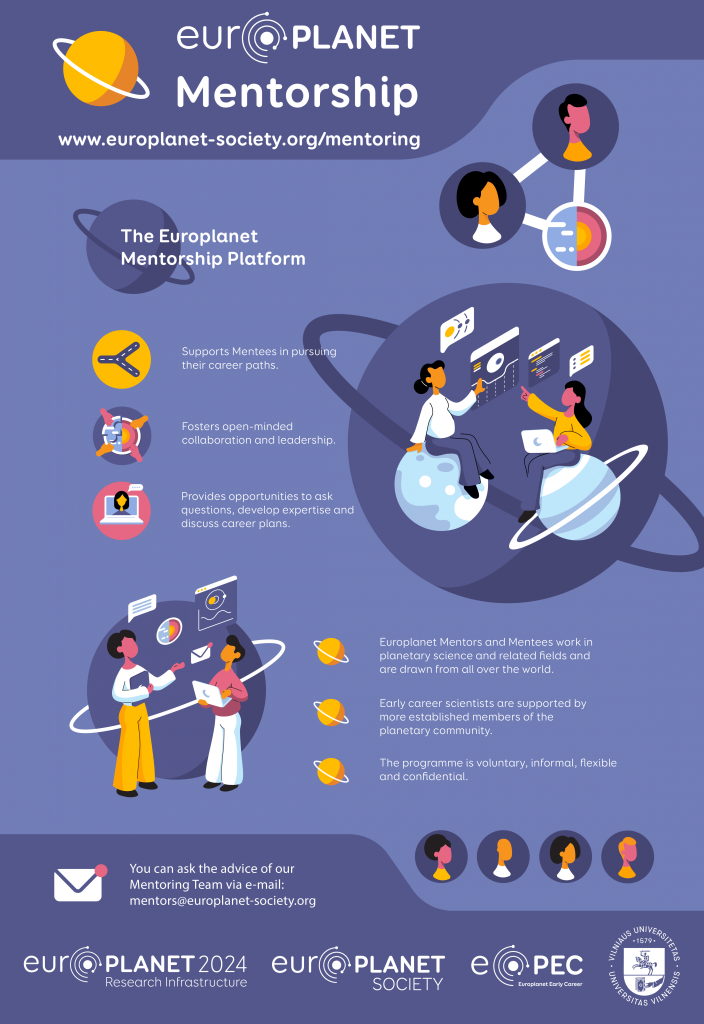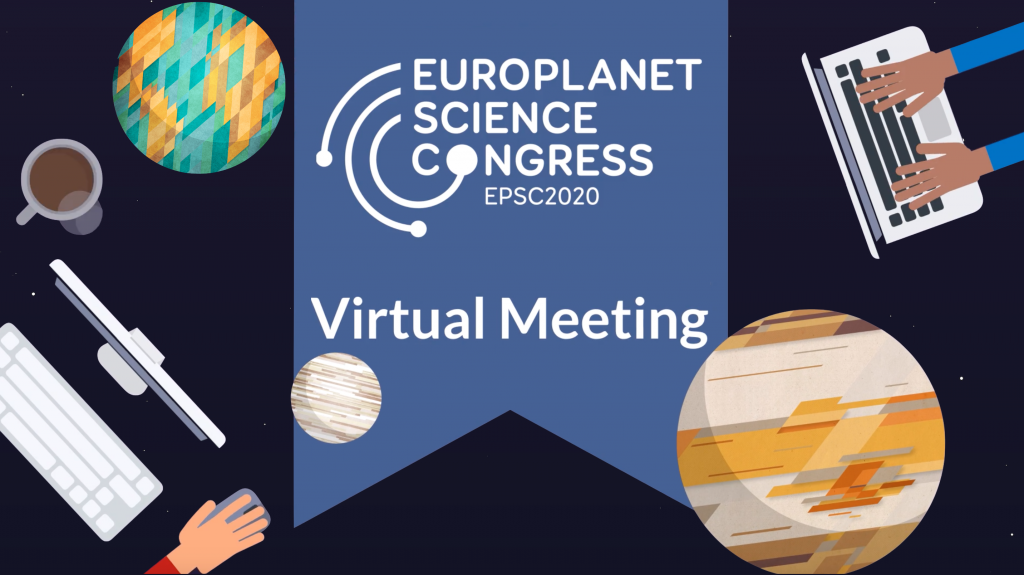Europlanet Early Career (EPEC) Annual Week 2024 – 6th Edition
Details of EPEC Annual Week 2024
Dates: 25-28 June 2024
Venue: University of Padua’s Department of Geosciences/Online
Programme: Now Available
The EPEC Annual Week is an event that gathers Early Careers from everywhere in the world, where different seminars and workshops foster a healthy, collaborative, and interactive reflection on topics related to academia and the challenges that early careers face. In 2024, for the first time, it will be held as a hybrid meeting to allow all the people interested to join and participate. The school is organised by the Europlanet Early Career network (EPEC) and provides participants with the opportunity to engage with other young researchers.
The EPEC Annual Week takes place in the spring/early summer of each year in a different location around Europe, and this year Italy will be the host country thanks to the participation of the University of Padua.
The EPEC Annual Week is an opportunity for the EPEC community to better get to know each other, to brainstorm on how to further develop the network in terms of the activities of its working groups and to enhance the interaction with members of the Europlanet Executive Board, who will be invited to give talks throughout the week. Furthermore, the school brings together young scientists from all EU countries and provides a networking platform where science discussion and collaboration are stimulated via a series of group activities.
Who can participate
Participants must be Early Careers (either be in their final year of an MSc course or be currently enrolled in a PhD program) in the field of planetary/space science or have obtained their PhD qualification not earlier than 2017. Note that in order to apply to the training school you are NOT required to be a member of EPEC, although this is encouraged.
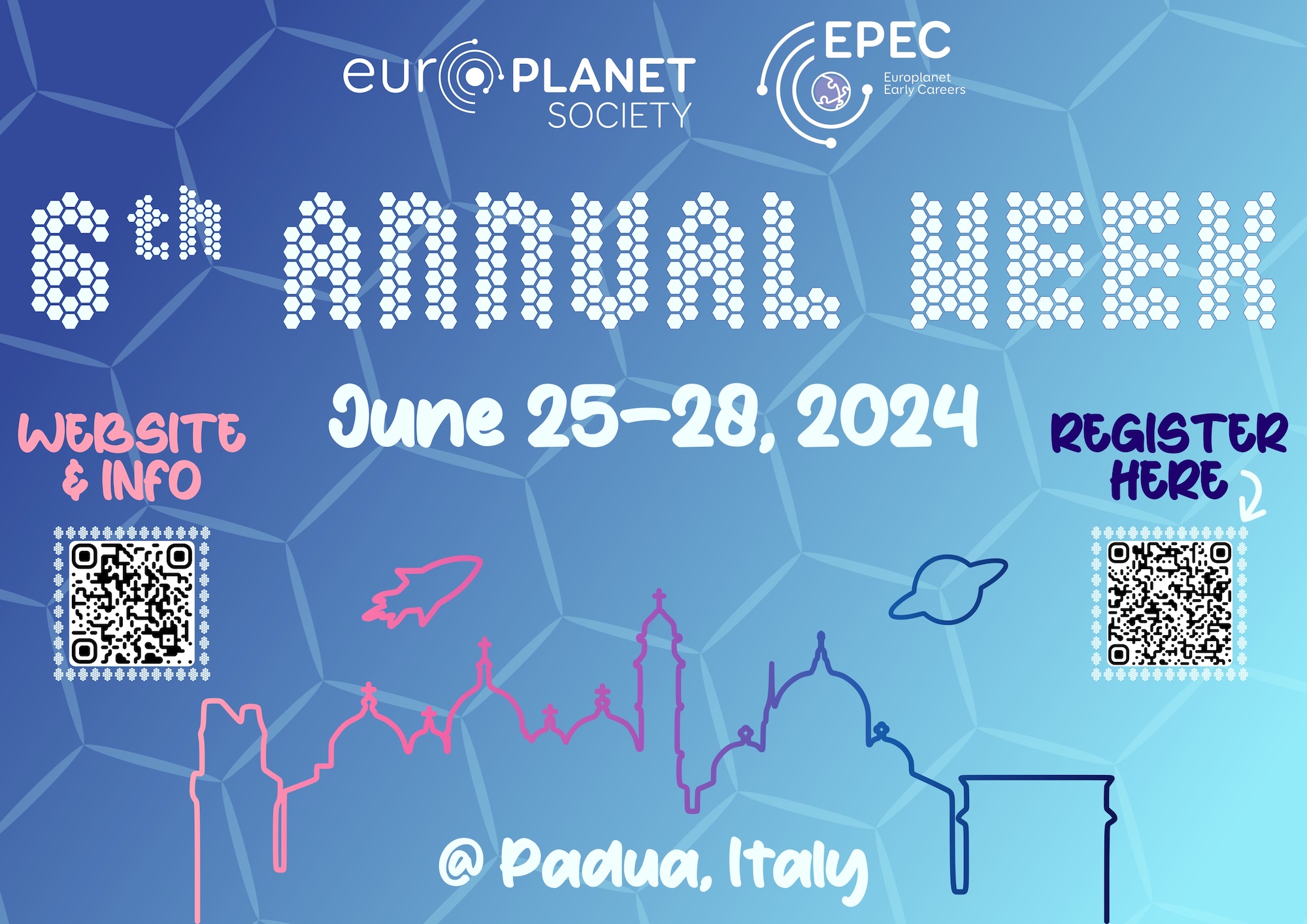
The 2024 edition of the EPEC Annual Week will take place in Padua, Italy. Sessions and activities related to the meeting will take place at the University of Padua’s Department of Geosciences. The Department is located just 15-20 mins walk from the city center in Via Giovanni Gradenigo 6.
Programme
The programme for this year’s EPEC Annual Week will cover:
- Introductions and sessions on:
- Planetary science and industry (with a particular focus on Italy)
- Fellowships and other opportunities
- Outreach and science communication
- Mental health and work/life balance
- EPEC activities
- Social events
Registration
Registration has now closed.
Successful applicants will be notified via e-mail within two days after the submission deadline. In case of any queries or problems related to the application procedure, please send an email to epec.network@gmail.com, including ‘EPEC Annual Week application’ in the subject.
Guidelines
Reporting Incidents
EPEC aspires to be a safe and respectful community, and will not tolerate harassment, bullying, discrimination or intimidation in any setting (online or face-to-face).
If you have experienced or have witnessed behaviour which is contrary to the Europlanet Code of Conduct please complete the Breach of Conduct Reporting Form.
Local Info
The 2024 edition of the EPEC Annual Week will take place in Padua, Italy. Sessions and activities related to the meeting will take place at the University of Padua’s Department of Geosciences. The Department is located just 15-20 mins walk from the city center in Via Giovanni Gradenigo 6.
How to arrive in Padua
By plane
Padua is easily accessible from nearby airports. Closest airports are Venezia “Marco Polo” airport (VCE), Treviso “Antonio Canova” airport (TSF), Verona “Valerio Catullo” airport (VRN) and Bologna “Guglielmo Marconi” airport (BLQ).
From Venice “Marco Polo” airport (VCE), Padua can be reached:
- by train, with a bus service from the airport to Mestre train station and from there a train to Padua (about 40 mins)
- by bus, departing in front of the airport and arriving at the bus station in Padua
- by private transport, taxi or GoOpti (private or collective) transfer service
- Please note that there is no bus or train service at night.
From Treviso “Antonio Canova” airport (TSF), Padua can be reached:
- by bus, local buses (E060) departing to the right of the airport exit and arriving at the bus station in Padua (about 1h). Please note that there is no bus service at night.
- by private transport, taxi or GoOpti (private or collective) transfer service
From Verona “Valerio Catullo” airport (VRN), Padua can be reached:
- by train, with Verona Airlink from the airport to Verona Porta Nuova train station and from there a train to Padua (about 1h 15 mins)
- by private transport, taxi or GoOpti (private or collective) transfer service
- Please note that there is no train service at night.
From Bologna “Guglielmo Marconi” airport (BLQ), Padua can be reached:
- by train, with Marconi Express monorail train from the airport to Bologna Stazione Centrale train station and from there with a train to Padua (about 1h 30 mins). Please note that there is no train service at night.
- by taxi (about 1h 30 mins).
By train
The train station of Padua has daily direct connections through high-speed trains (Trenitalia and Italo trains) with major Italian cities such as Rome (3h 30 mins), Milan (2h), Naples (about 5h), Florence (about 2h), and of course Venice (Venezia) Mestre (15-30 mins).
The taxi waiting stand is right in front of Padua’s train station.
A luggage storage service is open every day from 6 am to 8 pm next to platform 1.
Hotel info and location
Participants will be accomodated in double rooms with breakfast included at the Hotel “Al Fagiano” located in Padua’s historical city center (Via Antonio Locatelli 45) just a few minutes walk from the Basilica del Santo and Prato della Valle.
How to get from the train station to the hotel and back
Tram stops and numerous bus lines are located close to the hotel. From the Padua train station the easiest option is to take the tram Sir1 in the direction of “Santo” and get off at the “Santo” stop, from there, cross the street and take the 1st street on the right (Via Locatelli) where the hotel is located at n.45. The whole trip takes about 10-15 mins.
How to get from the hotel to the venue and back
The venue is located approximately 25 mins walk from the hotel. Alternatively, you can combine a bus trip and some walking, which will take a similar amount of time.
Possible route from the hotel:
- Take Line U13 at “Businello Santo” stop, get off at “Scardeone 2” stop and then walk for 12 mins
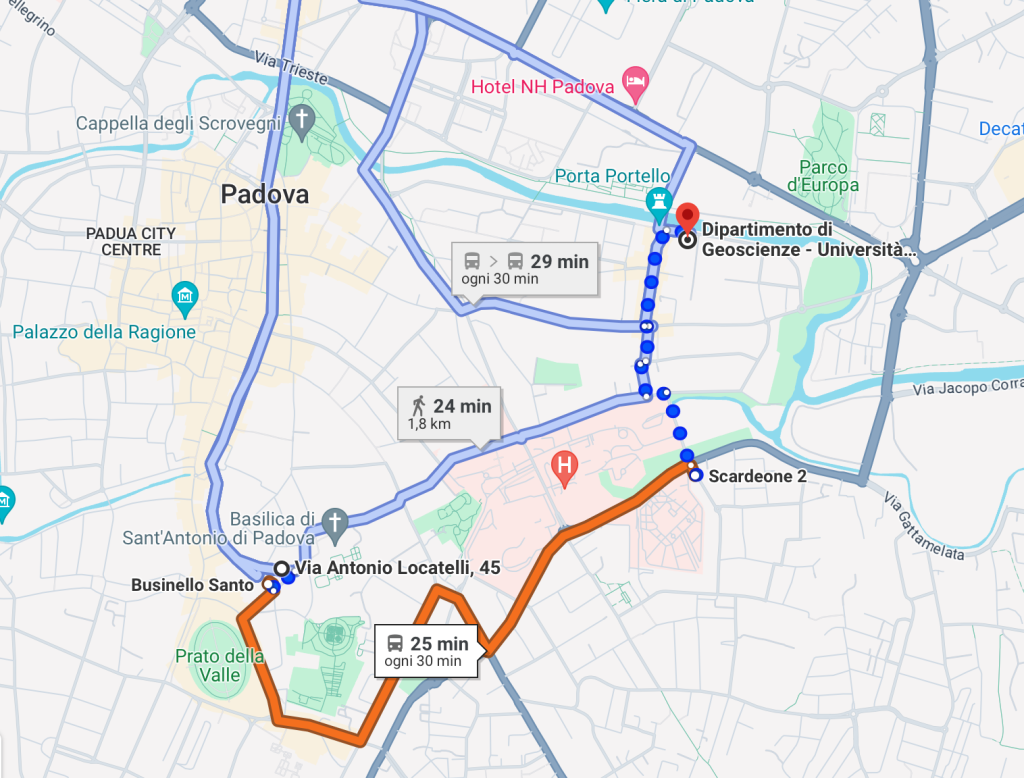
- Take Line U03 at “Businello 4” stop, get off at “Tommaseo 114” stop and then walk for 5 mins
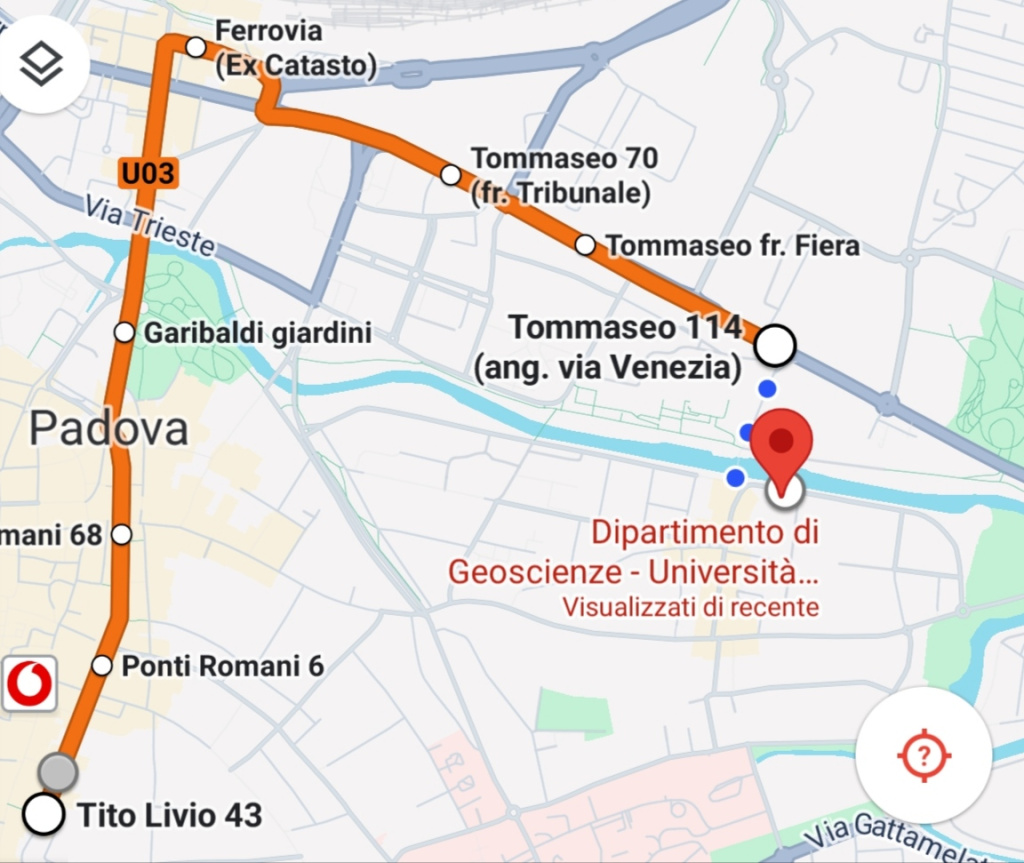
You can do the reverse journey to come back. All the info about bus lines and stops can be consulted on Google Maps or on the Moovit app.
Moving around Padua
The city of Padua has local buses and trams. Timetables, maps, and information on where to buy tickets are available here
If you prefer an alternative and sustainable way to explore the city there are bike sharing (Mobike, GoodBike) and e-scooters (BIT Mobility, Dott) services. More info is available here
Taxi service is also available 24h (Radio Taxi Padova). Short taxi trips within the city center should cost about 10-20 euros. More info is available here.
Consider also downloading the app Moovit for planning your trip.
About Padua
Padua (Padova, in the Italian language) is located in the center of the Veneto region, close to the lagoon city Venice. Populated since the Roman’s time, Padua is a city rich in history and culture. The city is an UNESCO site for the “Orto Botanico” (Botanical Gardens), which is the oldest in the world, and the “Cappella degli Scrovegni” (Scrovegni Chapel), painted by Giotto in 1305.
Padua is also home to one of the oldest universities in the world and the second oldest university in Italy. Founded in 1222, the University has always played a central role in Astronomical sciences. Many important people visited, taught or studied at Padua: for example Nicolaus Copernicus and Galileo Galilei. Galileo was a professor at the University of Padua, and during his stay in the city, he discovered the four Moons of Jupiter using his telescope: Io, Europa, Callisto and Ganymede.
In 1671 the University of Padova obtained the permission to build an astronomical observatory. Giuseppe Toaldo, priest and professor of astronomy, identified the Torlonga tower as the perfect place (now called “Specola”). In 1777 Torloga became the first observatory of the University, to which was added those of Asiago in 1942 (Cima Pennar) and in 1972 (Cima Ekar).
Social Events and Excursions
Details coming soon.
EPEC Annual Week Organising Team
- Beatrice Baschetti, INAF
- Silvia Bertoli, INAF
- Nicole Costa, University of Padua
- Jessie Hogan, Open University (EPEC Co-Chair)
- Melissa Mirino, INAF (EPEC Co-Chair)
- Giovanni Munaretto, INAF
- Gloria Tognon, Center of Studies and Activities for Space “G. Colombo” – CISAS
Past EPEC Annual Weeks
Find out more about past EPEC Annual Weeks.

